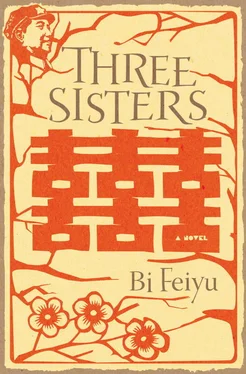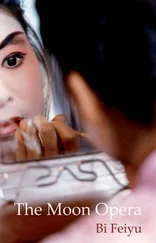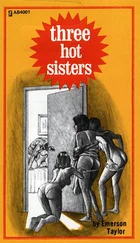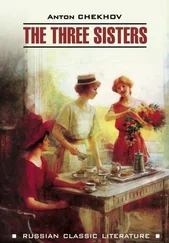In fact, the issue of her marriage had never been brought up. Wang Lianfang was, after all, a Party secretary, not just anyone—a fact that many families found intimidating. Even the matchmakers had passed Yumi by. All shrewd matchmakers believed the saying that an emperor’s daughter never had to worry about finding a husband. Given her family background and good looks, Yumi could easily spread her arms and turn them into the wings of a phoenix.
Peasants do not have the luxury of taking winters off, for that’s when they have to work on their equipment after the year’s use. Everything—waterwheels, feed troughs, buckets, farming skiffs, pitchforks, shovels, rakes, flails, and wooden spades—needs attention, some to be repaired, others to be mended, sharpened, or oiled. Nothing can be overlooked or put off. The most taxing job, but also the most urgent, is repairing the irrigation system. Didn’t Chairman Mao himself say that irrigation is the lifeline of agriculture? A peasant himself, the Chairman would have been a formidable farmer if he had not gone off to Beijing. He was also correct in pointing out that water is the first and foremost of the eight principles: water, fertilizer, soil, seed, density, care, labor, and management. Irrigation work usually takes place in the winter, and major repairs are especially hard on the peasants, who wind up more exhausted than when they’re out working in the fields.
There is one more thing that must not be forgotten—the Lunar New Year’s holiday. In order to wrap up the current year and obtain good omens for the year to come, all families—from the laziest to the busiest—need a decent New Year’s holiday. No one is spared from the hard work of washing and scrubbing; frying peanuts, peas, and broad beans; popping rice; dusting; repairing walls; and steaming rice cakes and buns. Pleasurable aromas permeate every house, shrouding them in steam.
Then there are the social obligations that require attention. And so, in the middle of winter, and especially during the last month of the old year and the first month of the new, a time when there is no actual farm-work, the peasants are busier than ever. As the saying goes, “Celebrate in the first month, gamble in the second, and till the fields in the third.” The second lunar month is the farmers’ only free time, days when they visit relatives and try their luck at gambling. They must turn to the land for survival early in the third lunar month, right after Qingming, the tomb-sweeping holiday, which falls on April 5 in the Western calendar. However important or involved other matters may be, the peasants’ livelihood is buried in the ground, and it must be plowed up in the first days of spring if the farmers are to survive another year. City folk like to sing the lament, “Spring days are lamentably short,” but theirs is too refined a view, embellished by sentimentality. For peasants, the meaning of that phrase—twenty or thirty fleeting days—is genuine and literal. Those good days of spring are gone so quickly they leave no time for even the briefest lament.
Yumi scarcely left the house during the second month because she was too busy taking care of Little Eight. No one forced her; she was happy to do it. A girl of few words, she carried out her duties meticulously, especially those involved in looking after the family. Eager to do well in everything, she worked without complaint, tolerated no criticism, and refused to accept the proposition that there could be a better family than hers. And yet, the absence of a male heir had been the subject of gossip swirling around her family. As a girl, she could not make her views on this matter public, though she had been anxious, worried even, for her mother’s sake. But now everything was fine, because with the arrival of Little Eight, people had nothing to talk about. She quickly assumed the care of her brother and took over all her mother’s exhausting duties, carrying them out with quiet, single-minded devotion. Naturally gifted in the business of childcare, she held the baby like a real mother after only a few days, cradling his smooth head in the crook of her arm as she rocked him and hummed lullabies. At first she was a bit shy and performed some of her duties awkwardly. But there are different kinds of shyness; one kind can be upsetting, another kind can be a sign of pride. With Little Eight in her arms, Yumi kept company with the married women of the village, engaging the young mothers in discussions or exchanging ideas on topics such as what to watch out for after burping the baby, the color of the baby’s stool, or the baby’s expressions and what they meant. While these may seem trivial and insignificant, to these women they were important topics of conversation that brought considerable pleasure.
After a while, Yumi stopped looking like a sister caring for her baby brother, and she no longer sounded like one. The proper, steady, and absorbed way she held him put everyone’s mind at ease; she was so tightly bound to the baby that nothing else seemed to matter. In a word, Yumi exuded the air of a young mother, which caused Little Eight to get his kinship wrong, for as long as his belly was full he refused to cling to Shi Guifang. His dark eyes were always fixed on Yumi, and though his focused gaze may not have held any particular meaning, he never let her out of his sight. After gazing down at Little Eight for a while, she too would sometimes slip into a sort of trance for no apparent reason other than a yearning for her own marriage. At moments like that she easily lapsed into daydreams, planning her own future in a vacuum. But she remained single nonetheless.
The village was home to a few passable young men, none of whom she considered to be a good match, who clammed up if she approached when they were talking to other girls. Their eyes darted around in their sockets like startled fish. This always saddened Yumi and made her feel lonely. She believed the old people when they said that a door’s high threshold has its virtues and its vices. Several of the girls her age who had been spoken for would sneak around cutting out shoe soles for their future husbands, and when Yumi spotted them doing this, instead of laughing at them, she’d steal a glance at the size of the soles and guess the boy’s height. She couldn’t help it. Fortunately, the girls never gloated in front of her; in fact, they felt inferior.
“This is the best we can do,” they’d say. “Who knows what grand family Yumi will find.”
Encouraging talk like that secretly reinforced Yumi’s belief that she was slated to have a brighter future than any of them. But when nothing came of it, her happiness seemed like a bamboo basket: Its holes were revealed when it was taken out of the water. At such times, strands of sadness would inevitably wrap themselves around her heart. Fortunately, Yumi was not overly anxious; these were only idle thoughts. Such thoughts are sometimes bitter and sometimes sweet.
Yumi’s mother grew lazier by the day. The physical toll of childbirth had undeniably affected her vitality. But it was one thing to hand Little Eight over to Yumi, and yet another to turn the whole household over to her. What does a woman live for anyway? Isn’t it to run a household? If she shuns even the authority to do that, what besides a rotten egg with a watery yolk is she? But there were no complaints from Yumi, who was content with the way things were. When a girl learns to care for a baby and take charge of a household, she can wake up that first morning after her wedding day fully prepared to be a competent wife and a good daughter-in-law, someone who need not be in constant fear of what her mother-in-law thinks. There was another reason Yumi liked the new arrangement: her sisters—Yusui, Yuxiu, Yuying, Yuye, Yumiao, and Yuyang—had never before bowed to her authority, though they all called her eldest sister. The second girl, Yusui, was slightly simpleminded, so there was no need to worry about her. The key figure was number three, Yuxiu, who had carved out her own territory at home and in the village, employing her intelligence and her native ability to please people. And there was more: Yuxiu, who had large, double-fold eyes, fair skin, and a pretty face, could be cunning when she needed to be. Even a minor slight might send her into their father’s arms to pout. Yumi could never bring herself to do that, which was why their father favored Yuxiu. But now everything had changed. Yumi not only took care of Little Eight, she had also been given charge of the household and had assumed the responsibility for keeping her sisters in line. This would not have been the case if their mother had not relinquished her authority; but now that she had, Yumi, as the eldest, was in charge. That’s the way it always is.
Читать дальше











